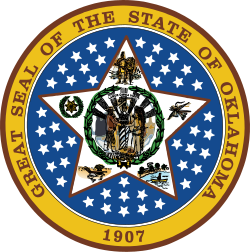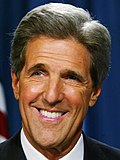This article needs additional citations for verification .(March 2008) |
| |||||||||||||||||||||||||||||||||||||||||
40 pledged delegates to the 2004 Democratic National Convention | |||||||||||||||||||||||||||||||||||||||||
|---|---|---|---|---|---|---|---|---|---|---|---|---|---|---|---|---|---|---|---|---|---|---|---|---|---|---|---|---|---|---|---|---|---|---|---|---|---|---|---|---|---|
| |||||||||||||||||||||||||||||||||||||||||
 County Results Clark: 20-30% 30-40% 40-50% Edwards: 20-30% 30-40% 40-50% 50-60% Kerry: 20-30% 30-40% | |||||||||||||||||||||||||||||||||||||||||
| Elections in Oklahoma |
|---|
 |
The 2004 Oklahoma Democratic presidential primary, part of the process of selecting that party's nominee for President of the United States, took place on February 3, one of the seven nominating contests of 2004's "Mini-Tuesday". The primary election chose 40 pledged delegates to represent Oklahoma at the 2004 Democratic National Convention. The remainder of Oklahoma's 47 delegates consisted of unpledged superdelegates not bound by the results of the primary. The election was a closed primary, meaning that only registered Democrats could vote in this election. Wesley Clark won the primary by a razor-thin margin over John Edwards, making Oklahoma the only state to vote for Clark in the primary.



